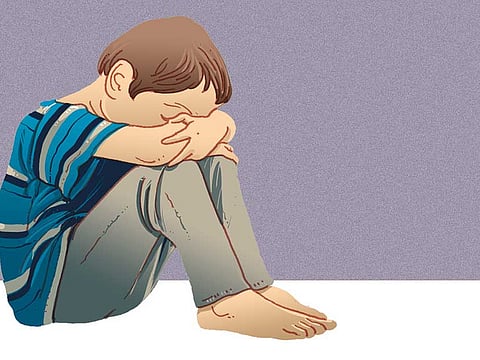Child abuse ... the root of all evil?
Neglect makes up for 78% of all cases of child abuse and its long-term effects of childhood emotional neglect are very visible in adulthood

Child abuse is the root of all evil. It creates mentally disturbed individuals, and the breeds extremists and offenders. It contributes to social destruction and disrupts a healthy lifecycle. When do we realise the immensity of this issue and how important it is to break the cycle?
When do we give it enough attention and take it upon ourselves to be responsible for our actions in creating tomorrow’s adult? When do we realise that it is easier to bring up a child than to rectify an adult?
I’ve worked at the Dubai Foundation for Women and Children for the past six years, raising awareness about child abuse and sheltering those who have been abused. We ran child protection campaigns, workshops, and talks for children, parents and educators. With a different theme every year, we have monitored the audience reactions with time.
We have also witnessed the Child Protection Law come to life. We have seen the media highlight extreme cases of child abuse that are monstrous. Great efforts are made to protect those that can’t voice their pain yet, but not all pain is noticeable.
According to the Child Protective Services (CPS), neglect makes up for 78 per cent of all cases of child abuse, and is greatly under-reported and often unnoticed by others. While that statistic is exclusive to the US it made me think if we as a society have it better or worse given nannies became the primary caretakers of a child.
I came across a video ad online of one of the nanny agencies that showed a nanny hugging the children, tucking them in bed while the parents were only visible on a dining table and a day out on the beach, and that made me think, if this is an ad that will sell their services, then what would be a red flag? If the emotional, physical and verbal affection was not given by a parent then how do we expect to raise an adult that is capable of maintaining good mental health, and healthy relationships?
When a father assumes that his son deserves less hugs than his daughter, because that will make him more of a man in the future, then who do we blame when the son becomes an abusive spouse?
When the daughter is inspired by likes of Kylie Jenner, at the age of 12, with low self-esteem and depression, who do we blame when her saving plan is for lip-fillers and she accepts being disrespected by boys and finds it flattering?
Long-term effects
The long-term effects of childhood emotional neglect are very visible in adulthood, and therapy if ever considered as an option, takes a long time. With a rise in divorce rates, commitment phobia, psychological issues and the continuity of the cycle of abuse, we need to ask ourselves what went wrong during our childhoods or our partner’s childhood.
According to Dr Jonice Webb, the author of ‘Running on Empty’ (Overcome Your Childhood Emotional Neglect) some of the themes that are visible in the neglected child, all grown up are: “Feelings of Emptiness: a general sense that you’re missing something that everybody else has. Counter-Dependence: going to great lengths to avoid asking for help, to not appear, or feel, needy. No Compassion for self-plenty for others. Guilt and Shame. Difficulty nurturing self and others. Poor self-discipline...”
So would we ask for help or continue assuming we are life’s victims and go on blaming others for every mishap in our lives as adults? Would we be aware of why we are the way we are? Would we hide behind substance abuse, endless partying and assume it’s the lifestyle that is the problem or the friends we have surrounded ourselves with? When reality is that we are running as far away from reality so we don’t have to deal with our sober emotions?
Wouldn’t it just be easier if we made a little more time for our children today, and gave them the love and attention they deserve? If we listened to their concerns, as unimportant as they seem sometimes, in comparison to the football match we’re watching? Or the time spent following a social media personality on snapchat? The invisible damage we cause today will last a lifetime, so is it worth it?
Fatma Al Falasi is a young Emirati writer who reflects on social issues that relate to Emirati youth. You can follow her at www.twitter.com/Fatmalfalasi.



